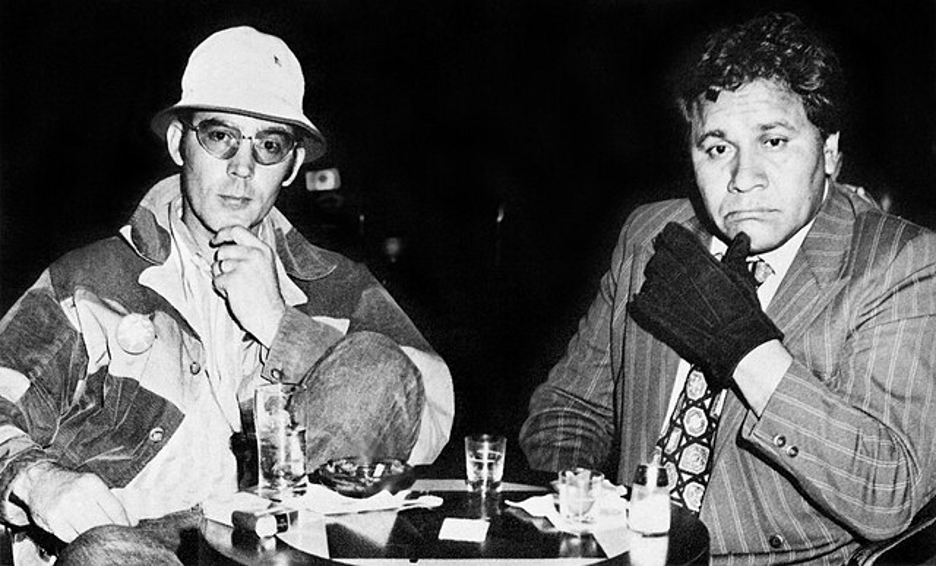I find myself sitting here in the Ethics room, room 338, beginning an article on one of the most depraved raving lunatic Hell-freaks that ever captured the American conscience, if but for a brief moment. I say one of many because for a short time in our nation’s history it really felt like the inmates were running the asylum. Anemoia is defined as the feeling of nostalgia for a time you’ve never experienced. As I sit in the back left corner of the room, not directly under the television, about two seats removed, staring up at the mural that says Romani Ite Dorum among myriad other small words I can’t read nor understand, I miss Hunter S. Thompson. I’m sure English professors all across Loyola and the broader eastern seaboard all just let out a collective groan when that thought escaped the confines of my mind. I’m not the first nor will I be the last young twenty something to express myself in this way. But it’s true, I mean it, I miss Hunter S. Thompson, I miss the times he represented, for better or for worse I think he was the last bastion.
Last week I made my roommates sit down and watch Terry Gilliam’s 1998 adaptation of Hunter S. Thompson’s seminal work “Fear and Loathing in Las Vegas.” Today I’m here today to make my pitch for why this movie should be required viewing for anyone at all interested in those middle 60’s years. I feel like it’s hard to pitch books to people, but you should absolutely read the book too. I will warn you, however, you’re in for a wild ride. The movie starts off at 110 and never lets up; right from the jump we are introduced to our two main protagonists, if these two men even merit such a term. Journalist Raoul Duke, an alias of Thompson played by Johnny Depp, and his attorney Dr. Gonzo, based on the legendary Chicano attorney Oscar Zeta Acosta portrayed ever so eloquently by Benicio del Toro, as they speed towards Las Vegas in a race to get checked into their hotel before the inhuman amount of sunshine acid they just ate begins to swallow them whole.
We discover through flashback that the reason our two intrepid freaks set off to Las Vegas in the first place was because Duke had received an assignment to cover a motorbike race for “Sports Illustrated.” Naturally, this was the sort of job that called for a bright red convertible, Acapulco shirts, a tape recorder, and of course, cocaine. On the surface, that’s what people will see in this movie, two drug-addled degenerates riling themselves up into a frenzy and wreaking havoc on the serenity of the assuredly kind and good-natured denizens of Las Vegas. And of course, I’m not saying there isn’t plenty of that in this movie, there’s about as much of that in this movie as you could find anywhere else. But past that intense debauchery is an equally meditative and self-conscious examination of the American spirit, the American dream, the counterculture movement of the 1960’s and its failures. All of this odd, beautiful prose pushes through all of the excess, the beautifully filmed sequences by director Terry Gilliam of Monty Python fame. There are a million memorable lines and scenes in “Fear and Loathing in Las Vegas,” but the ones that stick the most are Thompson’s most introspective moments.
After all is said and done, I’m left with a deep, bittersweet feeling. Thompson wrote this book in the early 70’s, and he is already ready to declare the 60’s counterculture movement a failure. Now, more than 50 years removed from the events he’s writing about, I find myself disappointed by the America I see around me. I wonder what Thompson would think of the world of 2024; I wish I could ask him. I think he was always dogged by this Raoul Duke caricature of himself, always trying to live up to his own legend that he created. Duke is endlessly entertaining, especially in this film, but what elevates “Fear and Loathing in Las Vegas” above the morbid fascination of two men trashing various hotel rooms is the breaks in the action where Hunter shines through. Give this movie a watch; it’s the best book to film adaptation I have ever seen and well worth the watch if you’re a fan of 90’s movies, 60’s counterculture, early 70’s cynicism, Monty Python, Johnny Depp, or Hunter S Thompson.







































































































